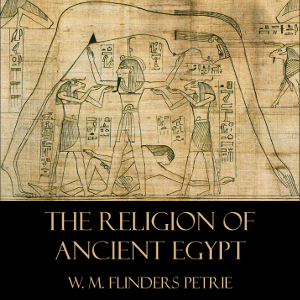The Religion of Ancient Egypt
William Matthew Flinders Petrie – the father of Egyptian Archaeology – developed and applied statistical analysis to pottery from prehistoric sites and by this established seriation as a relative dating method as a major contribution to Egyptian Archaeology. In this scientific paper he describes special varieties of the conception of the supernatural in ancient Egypt. The source text also includes a list of "principal works on Egyptian religion" and a list of works "on religions ancient and modern". (Summary by Kajo and Piotrek81)
Genre(s): Social Science (Culture & Anthropology), Other religions
Language: English
| Section | Chapter | Reader | Time |
|---|---|---|---|
| Play 01 | Chapter I: The Nature of Gods | Kajo |
00:08:46 |
| Play 02 | Chapter II: The nature of man | Kajo |
00:07:57 |
| Play 03 | Chapter III: The future life | Piotr Nater |
00:09:49 |
| Play 04 | Chapter IV: Animal worship | Piotr Nater |
00:10:10 |
| Play 05 | Chapter V: The groups of gods. Animal-headed gods | Piotr Nater |
00:11:12 |
| Play 06 | Chapter VI: The human gods | Piotr Nater |
00:16:07 |
| Play 07 | Chapter VII: The cosmic gods | Piotr Nater |
00:09:30 |
| Play 08 | Chapter VIII: The abstract gods | Piotr Nater |
00:05:22 |
| Play 09 | Chapter IX: The foreign gods | Piotr Nater |
00:05:21 |
| Play 10 | Chapter X: The cosmogony | Piotr Nater |
00:03:58 |
| Play 11 | Chapter XI: The ritual and priesthood | Piotr Nater |
00:06:58 |
| Play 12 | Chapter XII: The sacred books | Piotr Nater |
00:06:08 |
| Play 13 | Chapter XIII: Private worship | Piotr Nater |
00:05:45 |
| Play 14 | Chapter XIV: Egyptian ethics | Piotr Nater |
00:05:00 |
| Play 15 | Chapter XV: The influence of Egypt | Piotr Nater |
00:04:59 |
